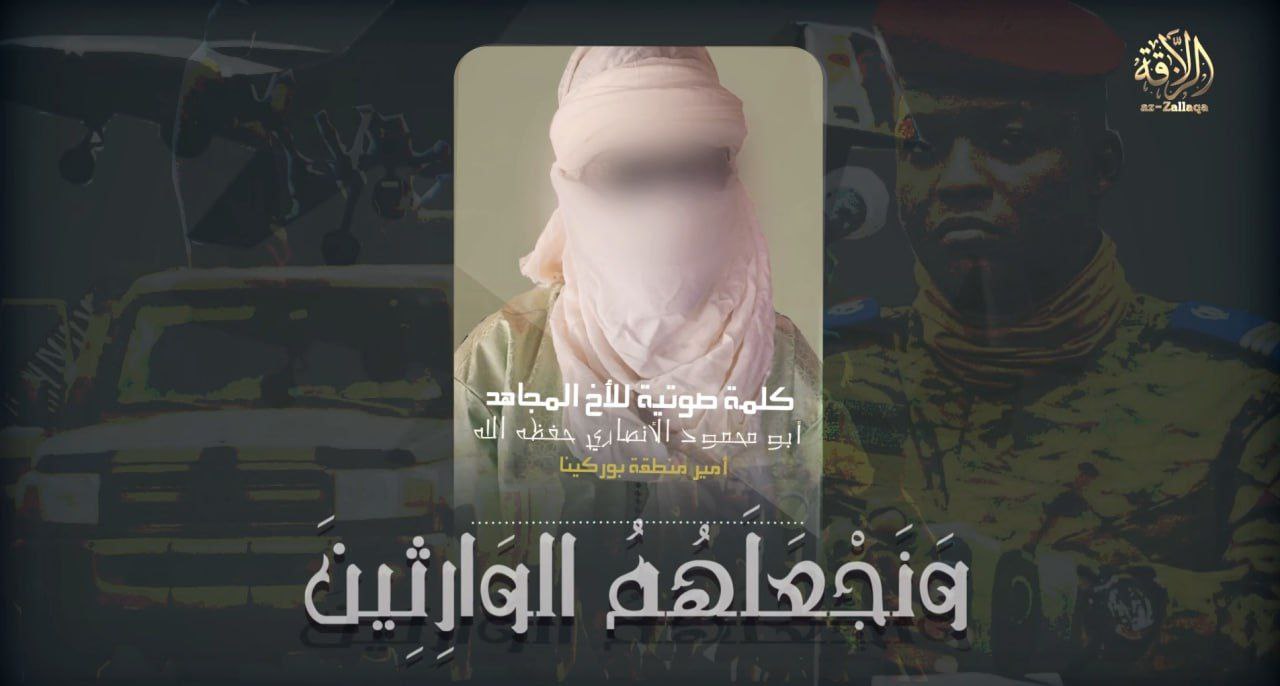
________________
Source: RocketChat
To inquire about a translation for this video message for a fee email: [email protected]
________________
Source: RocketChat
To inquire about a translation for this video message for a fee email: [email protected]
Click the following link for a safe PDF copy: Jamā’at Nuṣrat al-Islām Wa-l-Muslimīn — The Governments of the Sahel Countries and the Russian Legion- A New Episode In a Series of Crimes and Violations Against Innocent People
________________
Source: RocketChat
To inquire about a translation for this statement for a fee email: [email protected]
Click here for the first part in this video series.
—

______________
Source: RocketChat
To inquire about a translation for this video message for a fee email: [email protected]
Click the following link for a safe PDF copy: Jamā’at Nuṣrat al-Islām Wa-l-Muslimīn — Response and Condemnation Regarding the Recent Airstrike In Tinzaouatin
_______________
Source: RocketChat
To inquire about a translation for this statement for a fee email: [email protected]

The Islamic State today looks different than it did five years ago and is far more integrated now as an organization amongst its global network than al-Qaeda ever was. It has been 10 years since the Islamic State announced itself as a caliphate and more than five years since it lost its last vestige of territory in Syria. However, with the Islamic State back in the news due to an increasing external operations capacity (with attacks in Iran, Turkey, and Russia this year as well as numerous broken up plots in Europe), there is a fundamental misunderstanding of how the group operates today. In many ways, it is either incorrectly viewed through the lens of how al-Qaeda operates (a decentralized branch network), since it had previously been a part of al-Qaeda’s global network, or based on how the Islamic State operated when it was at its prior zenith when it controlled territory in Iraq and Syria. It is also likely why some within the U.S. government may have misinterpreted signals intelligence by pushing the idea that the Islamic State leader targeted in Somalia at the end of May, Abd al Qadir Mumin, became the group’s caliph. These changes in the past five years are crucial for policymakers to understand because the way the threat presents itself today will look different from how policymakers dealt with the issue last decade when much of the focus was on the Islamic State’s territorial control in Iraq and Syria.
The most important body for understanding the Islamic State today is its General Directorate of Provinces, which has previously been based in Syria, but new information suggests that at least at the highest levels of it might now have centrality in Somalia. When one understands that structure, the Islamic State’s actions globally make more sense. It is also why we see far more interaction and connection between its various wilayat (provinces) today than in the past. In many ways, the key aspects that animate the Islamic State as an organization (governance, foreign fighter mobilization, and external operations) remain, they have just moved from primarily being based out of or controlled by its location of origin in Iraq and Syria to being spread across its global provincial network. Its aims remain the same, even if the organization has adapted to a changed environment. It is also why the challenge from the Islamic State today is different from the past and why it is in some ways also more resilient now to pressure than before.
This makes the challenge of the Islamic State more difficult from a security perspective than in the past when there was the ability to primarily zero-in on its efforts in Iraq and Syria. Today, only focusing on Iraq and Syria or any other province independent of understanding its connections to other parts of the group’s global network will lead to missing crucial details due to expediency. This is why, although it is understandable that the United States has shifted a lot of its manpower and budgeting to more existential and larger problem-sets such as China and Russia, it would be a mistake to neglect the Islamic State as a continuing, but evolving security challenge. Therefore, it is still useful to continue to have and add more funded government positions across different agencies and departments to focus on tracking this threat to better get ahead of the next surprise. Otherwise, mistakes of misinterpretation will be made as in the past.
Click here to read the rest.

Click the following link for a safe PDF copy: Jamā’at Nuṣrat al-Islām Wa-l-Muslimīn — The Massacres Continue- The houses of God Are Bombed Above the Heads of the Worshipers
________________
Source: Telegram
To inquire about a translation for this statement for a fee email: [email protected]
The title of this release is in reference to Qur’anic verse 28:5. Here it is in full: “And We wanted to confer favor upon those who were oppressed in the land and make them leaders and make them inheritors”
—

________________
Source: Telegram
To inquire about a translation for this video message for a fee email: [email protected]

_______________
Source: Telegram
To inquire about a translation for this video message for a fee email: [email protected]

_________________
Source: Telegram
To inquire about a translation for this video message for a fee email: [email protected]

Thank you Mr. Chairman and members of the committee for giving me the opportunity to testify today on terrorism threats emanating from parts of the African continent, in particular focusing on issues and recommendations related to the Sahel region, especially in Mali where insecurity is getting worse by the day. There are two main jihadist groups now operating there: the Islamic State’s Sahel Province and Jamaat Nusrat al-Islam wal-Muslimin (JNIM).
This increased insecurity can be directly linked to the August 2022 withdrawal of French forces operating under the Operation Barkhane counterinsurgency mission. At the time of the French departure, the Mali insurgency had not been deterred or defeated, but it has undoubtedly worsened since. This suggests France at the very least was managing the situation in hopes that a future easing of the political tempest would facilitate a more sustainable resolution. The French withdrew at the request of the government of interim Malian president Assimi Goita, who seized power after a May 2021 coup and expressed his preference for the Russian-sponsored Wagner Group as a counterterrorism partner.
The latter point highlights the fact that Washington and its allies cannot bifurcate counterterrorism and great power competition. A position that casts counterterrorism and great power competition as an either/or challenge will only undermine the challenge of both. While this discussion is focused on Mali and the Sahel more generally, this dynamic first occurred in Syria since the 2011 uprising and is also playing out in Afghanistan following the U.S. withdrawal in mid-August 2021.
Click here to read the written testimony it in full.